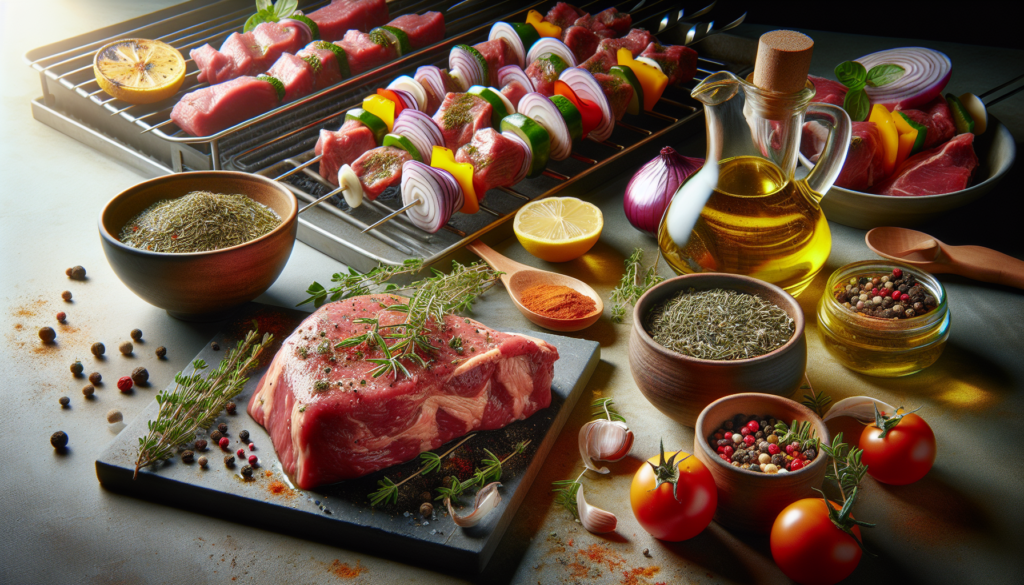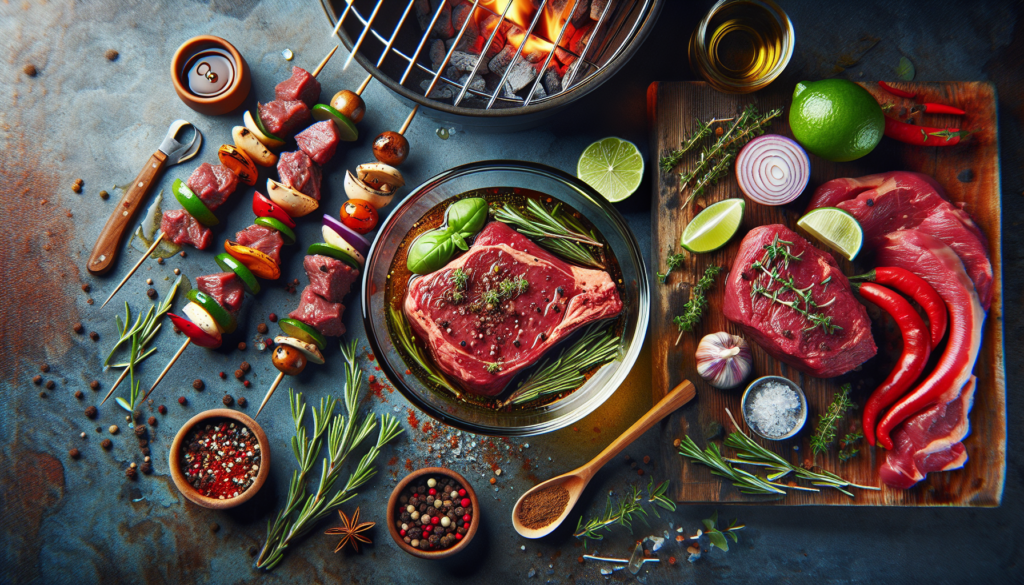So, you’ve got your grill fired up and you’re ready to throw some juicy cuts of meat on it. But hold on, have you thought about marinating your meat beforehand? Marinating not only enhances the flavor but also tenderizes the meat, making it melt-in-your-mouth delicious. In this article, we will explore some of the best ways to marinate meats for grilling, so you can take your grilling game to the next level and impress your friends and family with mouthwatering, perfectly seasoned grilled dishes. Get ready to elevate your grilling experience and make your taste buds dance with every savory bite!

Choosing the Right Meat
When it comes to marinating meats for grilling, it is crucial to start with high-quality cuts. Look for meats that are fresh, well-trimmed, and have a good amount of marbling. Marbling refers to the streaks of fat that are dispersed throughout the muscle fibers, and it can enhance the flavor and tenderness of the meat. Opt for cuts that are relatively uniform in thickness, as this will ensure even cooking. Whether you prefer chicken, beef, pork, lamb, or seafood, selecting the right type of meat is the first step towards a flavorful and successful grilling experience.
Understanding the Science of Marination
Marination is not just a simple process to add flavor to your meat; it is also a scientific process that enhances both texture and flavor. When meat is marinated, it is exposed to an acidic marinade, which helps to break down the muscle fibers and connective tissues. This tenderizes the meat, making it more juicy and tender when cooked. The marinade also acts as a flavor enhancer, as the meat absorbs the flavors of the ingredients. Through the process of osmosis, the meat absorbs the liquid and spices, resulting in a beautifully seasoned and succulent final product.
Preparing the Marinade
Creating a delicious marinade is an art in itself. To ensure tender and flavorful meat, the marinade should consist of both acidic and oil-based ingredients, as well as a combination of seasonings, herbs, and spices. Acidic ingredients, such as vinegar, citrus juice, or yogurt, help to tenderize the meat by breaking down the connective tissues. Oil-based ingredients, like olive oil or sesame oil, help to retain moisture and prevent the meat from drying out on the grill. Balancing the flavors in the marinade is important, so be sure to taste and adjust the seasoning as needed before adding the meat.
Marination Time
Determining the optimal marination time can vary depending on the type of meat and your personal preference. Delicate meats, such as seafood or poultry, require less marination time. These meats can be marinated for as little as 30 minutes to a few hours. On the other hand, tougher cuts of meat, like beef or lamb, benefit from longer marination times. These meats can be left in the marinade for several hours or even overnight for maximum tenderness and flavor. It is important to note that marinating meats for too long can result in an overly acidic or mushy texture, so it’s always best to follow a recipe or guidelines for marination times.

Proper Marinating Techniques
To achieve the best results, it is important to follow proper marinating techniques. One popular method is to use a resealable plastic bag. Place the meat in the bag and add the marinade, ensuring that the meat is fully coated. Seal the bag and massage the marinade into the meat, allowing for maximum flavor absorption. Another option is to use a glass or ceramic container, making sure that the meat is fully submerged in the marinade. Regardless of the method chosen, it is recommended to stir the meat occasionally to ensure even distribution of the marinade. This will help all parts of the meat to be equally tender and flavored. Lastly, it is crucial to avoid cross-contamination by properly cleaning any utensils or surfaces that come into contact with raw meat.
Temperature and Marination
Understanding the importance of temperature when marinating is key to ensuring food safety and flavor. Marinating at room temperature may seem convenient, as it speeds up the marination process. However, it also increases the risk of bacterial growth and foodborne illnesses. To prevent this, it is best to marinate your meat in the refrigerator. The cooler temperature slows down bacterial activity and ensures that the meat stays safe to consume. Additionally, marinating in the refrigerator allows for a more controlled and even marination process, resulting in well-flavored and tender meat.
Enhancing Grill Flavor
To further enhance the flavor of your grilled meats, there are a few additional techniques you can try. One is to use the marinade as a basting sauce while grilling. Simply reserve a portion of the marinade before adding the meat, and brush it onto the meat throughout the cooking process. This will not only add more flavor but also help to keep the meat moist. Another tip is to preheat your grill before cooking. This not only ensures that the meat cooks evenly but also adds a delicious sear and caramelization. Lastly, you can experiment with different wood chips or charcoal to give your meats a smoky taste. Each type of wood or charcoal imparts a unique flavor profile, so feel free to find your favorite combination.
Brining vs. Marinating
While marinating is a common method for flavoring and tenderizing meats, brining is another technique that can be equally effective. Brining involves immersing the meat in a solution of water, salt, and sometimes sugar. This process helps to improve the meat’s ability to retain moisture during cooking, resulting in juicy and flavorful results. Brining is especially beneficial for leaner cuts of meat, such as chicken breasts or pork chops, which can easily dry out on the grill. When deciding between marinating and brining, consider the type of meat and the desired outcome. Marination is more suitable for infusing flavors, while brining is ideal for adding moisture.
Best Meats for Different Marinades
Different marinades complement different types of meat, enhancing their natural flavors and textures. For chicken and poultry, consider marinades with citrus juice, herbs like thyme or rosemary, and ingredients like honey or soy sauce. Beef and steak pair well with bold flavors like Worcestershire sauce, garlic, and red wine. Pork and lamb benefit from marinades with ingredients like apple cider vinegar, mustard, and aromatic spices such as cinnamon or cumin. When it comes to seafood, a combination of lemon, garlic, and fresh herbs like dill or parsley can add a zesty and refreshing touch.
Tips for Successful Marination
To ensure a successful marination process, consider these additional tips. Poking holes in the meat with a fork or a meat tenderizer before marinating allows the flavors to penetrate deeper into the meat. It also helps to tenderize the meat further. Reserving a portion of the marinade as a sauce for brushing or serving alongside the grilled meat is a great way to enhance the flavors. However, it is important to avoid using the marinade that has come into contact with raw meat, as it can lead to foodborne illnesses. Lastly, it is always best to avoid excessive marination time, as it can result in an overly seasoned or mushy texture. Follow the recommended marination times for the specific cut of meat you are working with.
In conclusion, mastering the art of marination is the key to achieving flavorful and tender grilled meats. By choosing the right cuts of meat, understanding the science behind marination, and utilizing proper techniques and temperatures, you can elevate your grilling experience to new heights. Whether you prefer chicken, beef, pork, lamb, or seafood, there are endless possibilities to explore with marinades. So grab your favorite ingredients, get creative, and enjoy the delicious results that marinating can bring to your grilling adventures. Happy grilling!
